
Poems, Chiefly in the Scottish Dialect, commonly known as the Kilmarnock Edition, is a collection of poetry by the Scottish poet Robert Burns, first printed and issued by John Wilson of Kilmarnock on 31 July 1786. It was the first published edition of Burns' work. In mid-April 1786, Burns sent out printed Proposals for what was then titled Scotch Poems asking for people to sign up as subscribers, printing began on June 13, and the first copies were ready for distribution by July 31. 612 copies were printed. The book cost three shillings, in a temporary paper binding that most purchasers soon had replaced. There is no formal dedication at the start of the book, but Burns includes a dedication poem to Gavin Hamilton at pp. 185-191, and "The Cotter's Saturday Night" is "inscribed to R.A. Esq.," i.e. Robert Aitken.

Poems, Chiefly in the Scottish Dialect is commonly known as the first Edinburgh Edition and the partial second setting has become known as the Stinking Edition. It is a collection of poetry and songs by Robert Burns, first "Printed for the Author" by William Smellie in Edinburgh and published or "Sold by William Creech" of Edinburgh on the 17 April, an announcement being made in the Edinburgh Advertiser on that date, although the date 21 April 1786 is given by a few authors. The Kilmarnock Edition made Robert Burns Caledonia's Bard whilst the 'Edinburgh Edition' elevated him into a position amongst the world's greatest poets.
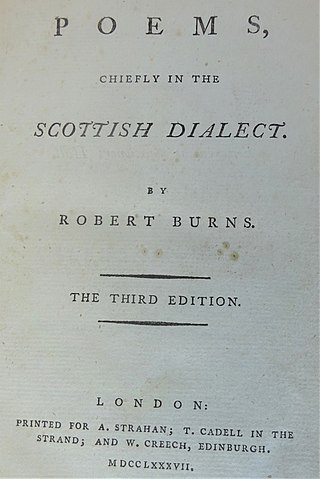
Poems, Chiefly in the Scottish Dialect is commonly known as the Third or London Edition and sometimes the Stinking Edition. It is a collection of poetry and songs by Robert Burns, printed for A. Strahan; T. Cadell in the Strand; and W. Creech, Edinburgh. MDCCLXXXVII The date of publication for the London Edition was in November 1787, however Strahan and Cadell had previously advertised for sale the 'Second' or 'Edinburgh Edition' using the 500 or so copies that William Creech still had that were unsold. The successful selling of these made a truly new 'London Edition' a commercially viable enterprise.

Duncan McNaught LL.D., J.P., was born in Alexandria, Dunbartonshire in 1845. He was the parochial school teacher at Kilmaurs in East Ayrshire from 1867 and served at the school for over fifty years, having served as assistant from 1865. He founded the Kilmarnock Conservative Association, jointly founded the Robert Burns World Federation, acted as the editor of the "Burns Chronicle" and was the president of what became the Robert Burns World Federation.

Poems, Chiefly in the Scottish Dialect was issued during the poet's lifetime In Two Volumes. The Second Edition Considerably Enlarged. It is a collection of poetry and songs by the poet Robert Burns, printed for T. Cadell, London, and W. Creech, Edinburgh. M,DCC,XCIII The date of publication for this edition was 16 February 1793 as advertised in the Edinburgh Courant. The successful demand for the 1787 Edinburgh Edition seems to have encouraged Creech to publish this new edition as the 1787 volume had been sold out since around 1791.
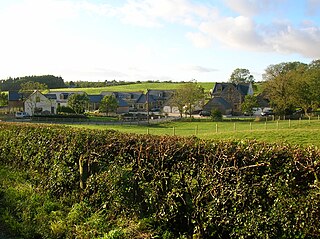
Handsome Nell was the first song written by Robert Burns, often treated as a poem, that was first published in the last volume of James Johnson's Scots Musical Museum in 1803 (No.551) with an untitled tune. Burns recorded in holograph on page three of his first Commonplace Book that he wrote the song or Rhyme at the age of only fifteen whilst living at Mount Oliphant Farm, it is regarded as his earliest production, inspired by a farm servant aged fourteen, named either Nelly Kilpatrick or Nelly Blair. Some confusion exists as he also gave his age as 16 in his autobiographical letter to Dr. Moore; the autumn of 1774 is generally accepted.

Robert Aiken was one of Robert Burns's closest friends and greatest admirers. He was born in 1739 in Ayr, Scotland. His father John Aiken, was a sea captain who owned his own ships and his mother was Sarah Dalrymple, distantly related to the Dalrymples of Stair. He became a writer or lawyer in Ayr and was referred to by Burns as "Orator Bob" in his poem "The Kirk's Alarm". Robert was famous for the power, beauty and quality of his oratory as his nickname infers.

'Robert Burns's Interleaved Scots Musical Museum' or the 'Interleaved Glenriddell Manuscript' is a set of four octavo volumes of James Johnson's The Scots Musical Museum in which Robert Burns provided additional material to the original publication on interleaved sheets and which he eventually gifted to Captain Robert Riddell (1755–94) of Friars Carse, Dumfries and Galloway, Scotland.
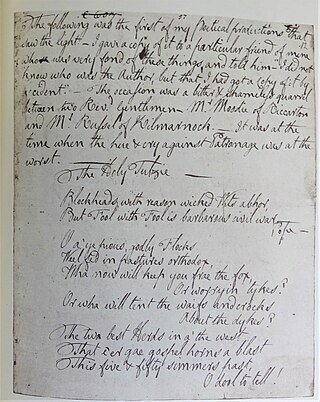
'The Holy Tulzie', 'The Twa Herds' or 'An Unco Mournfu' Tale was a poem written in 1784 by Robert Burns whilst living at Mossgiel, Mauchline, about a strong disagreement, not on doctrine, but on the parish boundaries, between two 'Auld Licht' ministers, John Russel and Alexander Moodie It was followed by "The Holy Fair", "The Ordination", "The Kirk's Alarm", "Holy Willie's Prayer", etc.
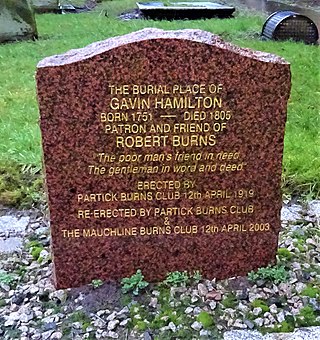
Gavin Hamilton was one of Robert Burns's closest friends and a patron. The first 'Kilmarnock Edition' of his poems were dedicated to Gavin Hamilton.

John Richmond (1765–1846) was one of Robert Burns's closest friends and confidants. He was born in Sorn parish at Montgarswood, Ayrshire, Scotland. His father, Henry Richmond, was a merchant in Mauchline and owned Montgarswood Farm that lies near Sorn. This farm passed to James, John's brother, having once been farmed by William Fisher, Burns's Holy Willie.

James Smith of Mauchline was one of Robert Burns's closest friends and confidants. He was born in 1765, son of a Mauchline merchant, Ayrshire, Scotland. In 1775, when he was only ten years, old his father, Robert Smith, a prosperous local merchant, was killed in a riding accident, falling from his horse whilst returning from Ayr. His mother, Jean Smith, remarried James Lamie who owned the adjoining house.

John Ballantine (1743–1812), was a Scottish merchant and banker and one of the greatest friends, admirers and closest confidants of Robert Burns. Significantly Ballantine gave the poet advice on the selection of poems for his First Kilmarnock Edition as well as being asked for his opinion on the bard's poems.

James M'Kie or James McKie (1816–1891) was an apprentice of Hugh Crawford, John Wilson's successor at the Kilmarnock Cross printing business. In 1867, M'Kie published the first facsimile edition of the 1786 "Kilmarnock Edition" or Poems, Chiefly in the Scottish Dialect as well as various bibliographies, reprints, special editions, limited editions, etc. of Robert Burns' and other works for the Scottish, British, British Empire or North American markets. He became an avid collector of Burnsiana and put together the largest collection of published in the world at the time, that was eventually purchased by the local Kilmarnock Corporation and housed in the Kay Park Burns Museum.

The Geddes Burns is a copy of Robert Burns's 1787 Poems, Chiefly in the Scottish Dialect with twenty-seven extra pages with twelve poems and songs in Burns's handwriting bound in, and a letter to Catholic Bishop John Geddes from the poet, written at Ellisland Farm.
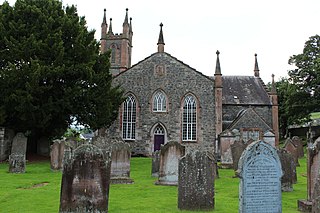
William Nicol (1744–1797) was a Scottish schoolmaster, and, if ill-tempered and vain, one of Robert Burns's close friends. He was born in Annan parish at Dumbretton, Dumfries and Galloway, Scotland. Burns referred to him in one letter as "Kind hearted Willie" and he accompanied the poet on his August 1787 tour of the Highlands. Burns's third son, William Nicol, born at Ellisland Farm in 1791, was named after his friend, the poet commenting that his newborn son had "that propensity to witty wickedness and manfu' mischief, which even at twa days auld I foresaw would form the striking features of his disposition."

Edward Whigham (1750–1823) was the landlord of a coaching inn, a bailie, Provost of Sanquhar, bibliophile and one of Robert Burns's close friends during his Nithsdale and Dumfries days. Edward married Jane Osborne.
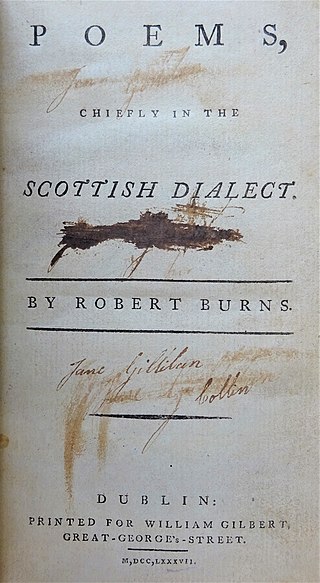
Poems, Chiefly in the Scottish Dialect was the second "pirated" issue of Robert Burns's work, being published in Ireland at Belfast without permission from or payment to the author or publisher. It is a so-called Stinking Edition, carrying the error Stinking for the Scots word Skinking (watery) in the poem "To a Haggis" because the type setters copied from a 1787 Stinking Edition of Poems, Chiefly in the Scottish Dialect. It has been shown to be from the same print setting as the Belfast Edition but with a different title page.

Poems, Chiefly in the Scottish Dialect was a 'pirated' edition of Robert Burns's work, being published in Ireland without permission from or payment to the author or publisher. It is a so-called 'Stinking Edition', carrying the error 'Stinking' for the Scots word 'Skinking' (watery) in the poem "To a Haggis" because the type setters copied from a 1787 'Stinking Edition' of Poems, Chiefly in the Scottish Dialect .

John Lewars (1769–1826) was an excise officer and land surveyor. He was one of Robert Burns's colleagues and friends during his Nithsdale and Dumfries days. Lewars moved with his sister Jessie Lewars in around 1793 to a house in Millhole Brae that lay immediately opposite that of Robert Burns in Dumfries. Jessie Lewars was a very close Burns family friend and helped the family by nursing Robert in the days leading up to his death, doing the domestic chores and caring for the children.






















